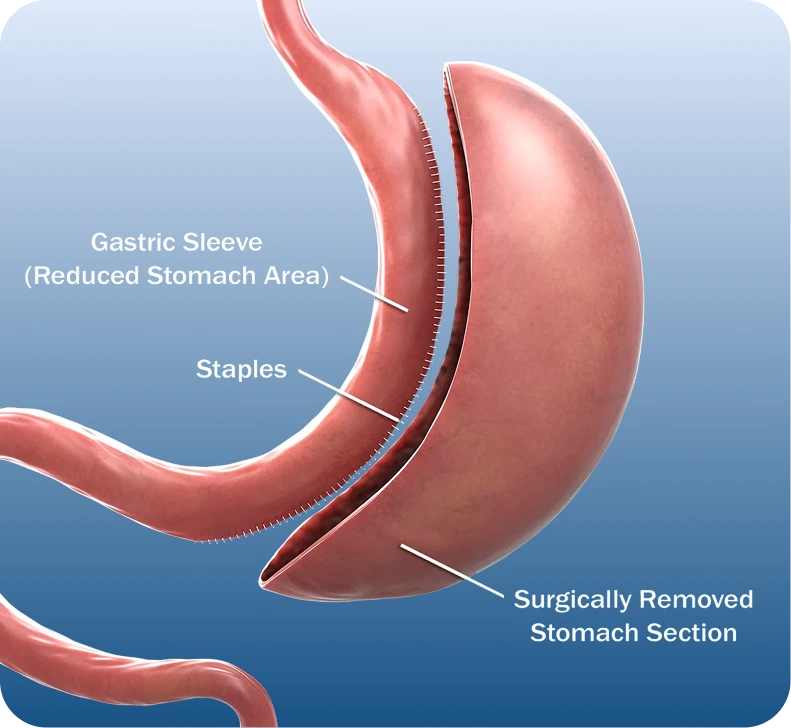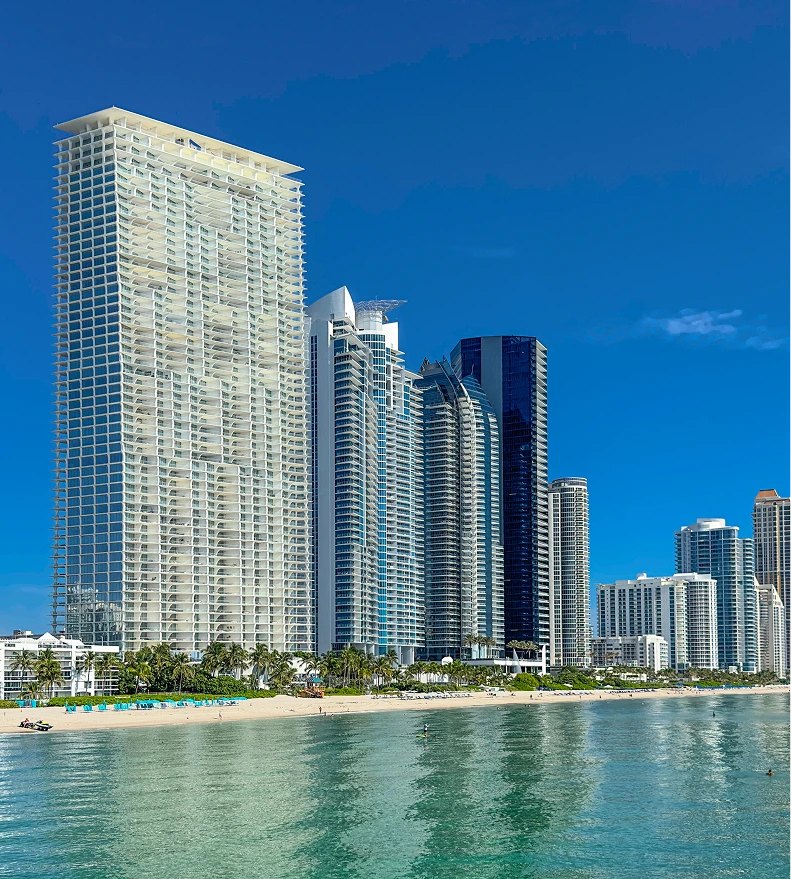Gastric sleeve surgery offers a transformative option for individuals struggling with obesity who have not achieved lasting results through diet and exercise alone. Many patients seek this procedure to improve overall health, manage weight-related conditions, such as diabetes or high blood pressure, increase mobility, and enhance quality of life. Miami VIP Surgery provides professional guidance and personalized care throughout the gastric sleeve journey, helping patients take a significant step toward a healthier, more active future.
Get expert care on your timeline with our signature Easy-Step Sleeve Program™.
Gastric sleeve surgery, also known as vertical sleeve gastrectomy, is a surgical procedure that involves reshaping the stomach to create a smaller, sleeve-shaped organ. By reducing the size of the stomach, the surgery limits food intake and alters how the digestive system processes meals. The smaller stomach can hold less food at one time, helping patients work toward their weight loss goals.

The Easy-Step Sleeve Program™ (ESSP)
Who wants to spend 6–12 months jumping through hoops, only to be told they don’t qualify?
Designed by Dr. Keshavarzi, MD, FACS, our signature program offers a streamlined process that removes the usual barriers of insurance approval, referral programs, and waiting lists. With personalized medical support, expert mindset coaching, and concierge-level care, we accelerate your journey to surgery in as little as 3 weeks - without sacrificing safety, results, or support.

How It Works
Meet with a weight loss expert (virtually or in person) to explore your best options.
Gastric sleeve surgery is performed under general anesthesia, which ensures that patients are completely unconscious and do not feel pain during the procedure. Our anesthesia team monitors vital signs closely throughout the surgery to maintain safety and comfort. Patients are carefully prepared before anesthesia is administered, including fasting and reviewing medical history to minimize any risks.
The surgery is performed laparoscopically, using several small incisions in the abdominal area. These incisions provide access for surgical instruments and a camera that guides the surgeon. The size and number of incisions are designed to reduce overall trauma and minimize post-operative pain while allowing precise control during the procedure.
During the procedure, a large portion of the stomach is removed to create a smaller, sleeve-shaped stomach. This vertical sleeve gastrectomy reduces the stomach’s capacity and changes how food moves through the digestive system. The reshaping process is carefully performed to maintain the stomach’s functionality while supporting the patient’s weight loss goals.
Once the stomach is reshaped, the edges are sealed with surgical staples to ensure no leakage occurs. The staples are placed with precision to create a secure and uniform sleeve. The incisions are then closed with sutures or surgical adhesive. This step is crucial for preventing complications and managing pain effectively after surgery.

During the first 24 hours after gastric sleeve surgery, patients are closely monitored in a hospital setting. Medical staff observe vital signs and manage pain to ensure stability. Fluids are typically given intravenously, and patients are encouraged to move gently to prevent complications. Early attention to hydration and comfort sets the foundation for a smoother recovery.
In the first week, patients begin transitioning to a liquid diet under careful guidance. Pain is managed with prescribed medications, and activity is gradually increased with short walks to support circulation. Follow-up appointments help monitor healing and ensure that all instructions are being followed correctly.
During weeks two to four, patients start incorporating soft foods while continuing medically supervised dieting. Energy levels may fluctuate, and patients are encouraged to listen to their bodies as they slowly resume light daily activities. Monitoring for any signs of complications remains essential during this period.
By weeks five to eight, most patients can gradually introduce solid foods as recommended by our healthcare team. We can help with portion sizes and food choices. Activity levels can increase, and many patients notice improved stamina as the body adjusts to the smaller stomach.
After two months, the focus of recovery shifts to maintaining long-term dietary habits and engaging in regular physical activity. Patients are encouraged to continue following their diet to support ongoing weight management. Regular follow-ups help track progress, address concerns, and reinforce lifestyle changes that promote lasting results.
Take our quick BMI quiz to discover if gastric sleeve surgery is right for you.
The cost of gastric sleeve surgery in Miami ranges from $12,000 to $18,000, depending on the surgeon’s experience, the facility fees, and any additional preoperative tests or services. Prices can vary between hospitals and surgical centers, and some patients may incur extra costs for anesthesia, lab work, or follow-up care.
Because individual needs and treatment plans can differ, the most accurate way to determine your personal cost is through a consultation with our team. During this visit, our specialists will review your medical history, discuss your goals, and provide a detailed estimate. Schedule an appointment at our clinic to speak with our doctors and decide on the best path forward for your weight loss journey.

Your Weight Loss
Journey Starts Here
Yes, Dr. Keshavarzi uses minimally invasive techniques for gastric sleeve and other bariatric procedures. These methods involve smaller incisions, which can reduce pain, speed up recovery, and minimize scarring while maintaining the highest standards of surgical precision.
Gastric sleeve surgery involves removing a portion of the stomach to create a sleeve-shaped organ. In contrast, gastric bypass surgery reroutes the digestive system by creating a small pouch from the stomach and connecting it directly to the small intestine. Both procedures are designed for obese patients who are unable to lose weight through diet and exercise alone. They support a healthier life by helping patients reduce excess weight and achieve a positive metabolic effect by altering nutrient absorption.
Many patients with high blood pressure can safely undergo gastric sleeve surgery. Our experienced doctor will create a treatment plan tailored to your personal needs, taking into account your body mass index and any other health conditions. Careful monitoring before, during, and after surgery ensures safety and effectiveness for patients with elevated blood pressure.
Gastric sleeve surgery can significantly improve metabolic conditions, such as sleep apnea and high cholesterol levels. Our medical staff works closely with patients to set realistic expectations and emphasize that lifestyle changes are essential to long-term success. Many patients can expect improvements in these conditions as they lose weight and adopt healthier habits.
Yes, they are generally considered safe. Our weight loss surgery center follows strict safety protocols to minimize complications. Dr. Keshavarzi and our team carefully evaluate patients for medical problems, such as gastroesophageal reflux disease, before surgery and provide continuous monitoring afterward. Patients are encouraged to contact Dr. Keshavarzi with any questions or concerns to ensure a safe surgical experience.
Dr. Keshavarzi is a board-certified bariatric surgeon with a focus on achieving exceptional outcomes and long-term success. When selecting a surgeon, it is crucial to consider their experience, patient outcomes, and approach to care. A consultation with Dr. Keshavarzi will allow him to answer your questions and help you decide on the best treatment plan for your weight loss goals. We can offer gold-standard procedures that provide impressive results with maximum comfort.